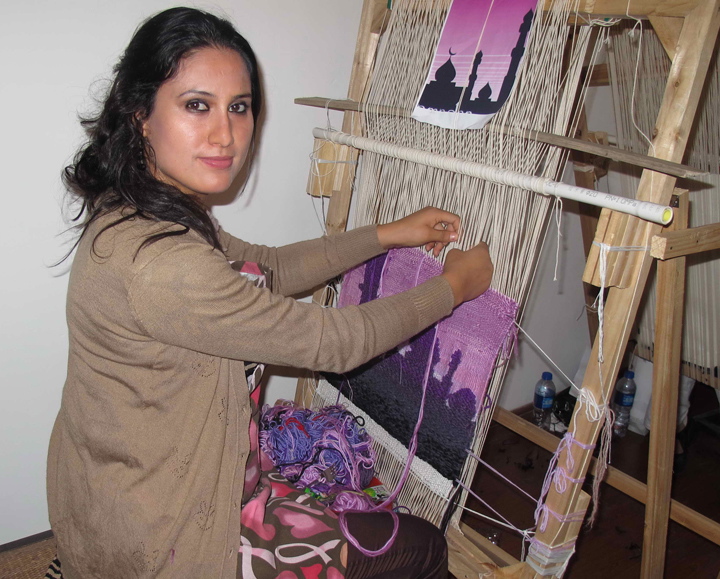

Building youth’s futures in Tunisia

Ever since Najet Salem was a young design student, she dreamed of two things: reviving the ancient carpet-weaving tradition and empowering the women artisans of her hometown of Gafsa, in southwest Tunisia.
"From the time I was young, I was fascinated by weaving and I sensed how many women who carried on this tradition were lacking support,” says the 25-year-old, today a successful businesswoman. “It hurt my heart to see that, compared with the products of (towns like) Ouedhrif or Kairouan, there was a big difference in terms of quality,” she says of Gafsa’s famous “Mergoum” carpets.
Local artisans were losing their expertise, Salem explains, and unskilled producers were eroding the traditional luster of the Mergoum carpet, whose unique bright colors and geometric patterns are reminiscent of the art of the Berbers and Romans.
Najet, still a student, had begun working with local artisans on carpet production when she was invited to take part in an MDG-Fund-supported training programme to improve entrepreneurial skills among Tunisian youth.
Training to build businesses
“For me, it was very important to restore the value of these local products and to revive the know-how that once prevailed in the region,” she says. “By being better educated, I could do better."
The training is part of the MDG-Fund’s work to reduce joblessness and migration among youth in Tunisia, where one third of all young people are unemployed.
Based in three areas with the worst job prospects and high risk for illegal migration, the programme targets the most impoverished youth and those who have the fewest opportunities to find work (both young university graduates and unskilled youth), with particular attention to young women who face discrimination based on sex.
The training helped Najet develop a business plan for her artisans, who work from home on designs developed by Najet based on traditional motifs. Najet advances part of the cost of the carpets and pays the balance when the finished product is delivered. The training also helped her to build networks and to show her goods at trade shows and fairs.
Today Najet employs 75 artisans and is looking to ramp up her production volume. She recently took part in a two-month internship in China to learn new technologies in carpet manufacturing, and is now providing customized carpets that she designs on her computer based on her clients’ specifications.
Investing in women’s futures
But the young entrepreneur takes the greatest pride in having boosted incomes and empowered her women weavers, some of whom live in very remote hamlets.
“The women of the region have never really seen their work validated. In fact, they had never really developed an entrepreneurial spirit. They needed a catalyst to streamline production, address and consolidate their market and creatively innovate,” says Najet, who is preparing to register her artisans for Social Security.
"In our region, people can’t conceive of the idea of women taking their destiny into their own hands, creating their own projects and dedicating themselves to them. It’s a challenge to the established order that dictates that it’s always the man of the house who plays that role.”
Najet, who also teaches at the local university, credits the strong networks that she has built with the support of the MDG-Fund for helping her company gain a foothold in the market, where a woman-led business was originally viewed with suspicion.
“I think that, with these women, we are changing the rules,” she says. “The kind of training that we are getting from the UN agencies is giving us the tools we need to move forward on a solid foundation. [Now] it is up to us to work on changing the attitudes and the prevailing culture in our region.”
Reducing unemployment and migration
The joint programme “Engaging Tunisian Youth to Achieve the MDGs” is a collaboration between five UN agencies (ILO, FAO, IOM, UNIDO, UNDP) and the Tunisian government to improve young people’s job prospects and reduce the risk of illegal migration. It targets young unemployed university graduates and unemployed unskilled youth in the governorates of Le Kef, Gafsa and Greater Tunis, with particular attention to young women.
The programme is part of the MDG-Fund’s work to support governments around the world in achieving the Millennium Development Goals of reducing poverty and improving livelihoods. One of 130 MDG-F joint programmes in 50 countries, this initiative targets MDG-1, eradicating extreme hunger and poverty.